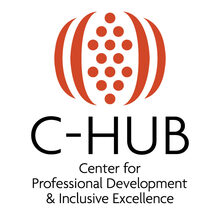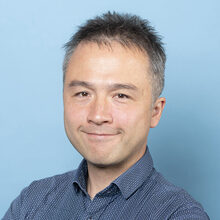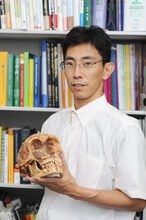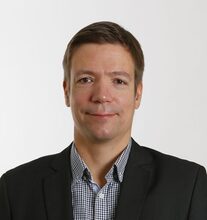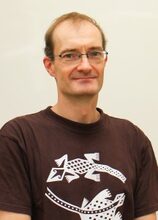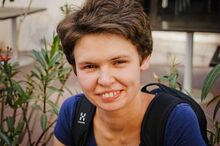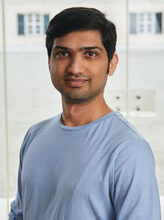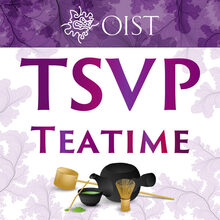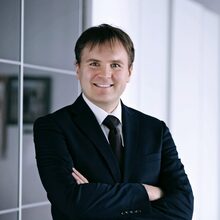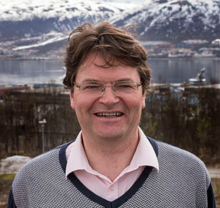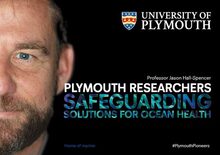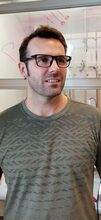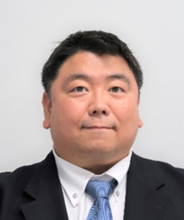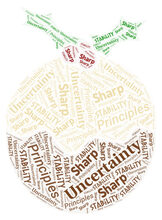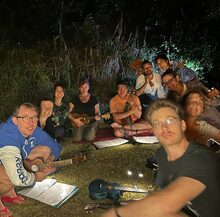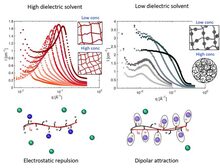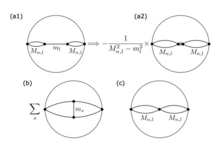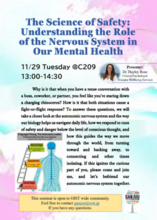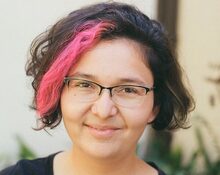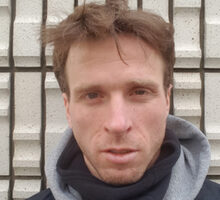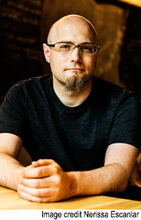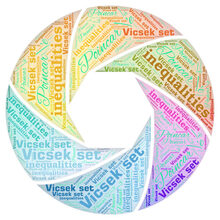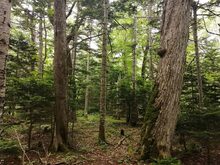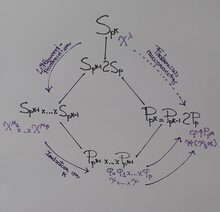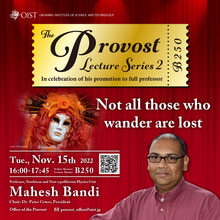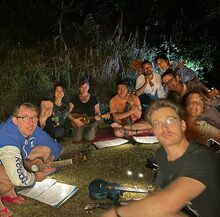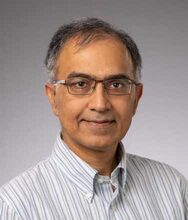Past Events
WS: "Effective, Fabulous Poster Presentations"
Come learn how to communicate your impactful ideas visually and engage audiences with poster presentations, an important skill set not only for scientists, but for all presenters! Poster presentations are an interactive, effective format for showcasing research or sharing ideas, programs, and projects.
Seminar: " DESHIMA: A Dutch-Japanese Astronomical Spectrometer based on Superconducting Microwave Resonators"
Akira Endo, Associate Prof. PhD., Delft University of Technology, Netherland
[Seminar] Ecocultural range-expansion model of modern humans in the Paleolithic
Prof. Joe Yuichiro Wakano: Professor at the School of Interdisciplinary Mathematical Sciences (IMS), Meiji University, Japan
[Seminar] Evolution of dispersal in metapopulation models
Prof. Kalle Parvinen: University Research Fellow at the University of Turku, Finland
What would you EAT for a sustainable future? Plant-based food and the possibility サステイナブルな未来のために私たちは何を食べるか。~プラントベースの食べ物とその可能性~
Vegan and plant-based cuisine have been attracting attention for their potential both as a developing market and as a sustainable choice. Haruko Kawano of VegeProject Japan will tell us about global trends, the context of this rising demand, and how to incorporate veganism into our diets.
14:00-15:00 Presentation followed by Q&A at B250 15:00-15:30 Food tasting at foyer and wood deck next to B250
AIEN and Yun-Taku will also sell vegan snacks and sweets after the talk
[Seminar] Hake as a climate winner: emerging fishery dynamics and management implications
Dr Xiaozi Liu: Postdoctoral Fellow at the Institute of Marine Research, Norway
[Seminar] Multiple-trait responses to size-selective harvesting in experimental guppy populations
Prof. Mikko Heino: Professor at the University of Bergen, Norway, and also affiliated with the Norwegian Institute of Marine Research and the International Institute for Applied Systems Analysis (IIASA), Austria
Ganjuu Open House
Friday, December 9th *4:00-5:30 PM*
Please join us for tea, coffee, and home baking! Bring yourself, your colleagues, your families and share some time, talk and listen to others. Come and see our new location! All are welcome :)
*Our location is now at the Former President's House by faculty housing and Lab 5.
[Seminar] Impact of present and future temperature conditions in North Atlantic fisheries: an elasticity analysis approach
Dr Anna Shchiptsova: Researcher in the Exploratory Modeling of Human-Natural Systems Research Group at the International Institute for Applied Systems Analysis (IIASA), Austria
[Seminar] Predicting safe operating spaces for the Northeast Arctic cod fishery in a warming ocean using a coupled bio-socio-economic model
Dr. Jaideep Joshi: Researcher at the University of Bern, Switzerland, and Guest Researcher at the International Institute for Applied Systems Analysis (IIASA), Austria
TSVP Teatime
"TSVP Teatime": informal discussions and getting to know each other
[Seminar] Determining ecosystem vulnerability through meta-analysis of empirical food webs
Prof. Karol Opara: Assistant professor at the Systems Research Institute, Polish Academy of Sciences, Poland
[Seminar] Climate change and cumulative impact in Arctic ecosystems
Prof. Raul Primicerio: Professor of Ecology and Evolutionary Biology at UiT, The Arctic University of Norway
[Hybrid Seminar] "Towards Hierarchical Motor Control" by Dr. Steve Heim, Biomimetic Robotics Lab at MIT
"Towards Hierarchical Motor Control" by Dr. Steve Heim, Postdoc, Biomimetic Robotics Lab at MIT
Seminar "Universally superposing quantum operations toward quantum functional programming" by Prof. Mio Murao (Univ. of Tokyo)
Seminar by Mio Murao, Professor at Department of Physics, Graduate School of Science, Universty of Tokyo, Languate (English)
[Seminar] Temperate carbonate reefs, 'blue carbon' and the 'plastisphere'
This talk will introduce two major forms of cold-water biogenic habitats. Deep-sea coral reefs are extensive in the NE Atlantic region due to high food availability and high carbonate saturation levels. Maerl beds are calcified seaweed habitats and are the oldest biogenic habitat type found in shallow waters of the region. (...)
[Seminar] "Molecular Tools in Electrochemical Carbon Dioxide Reduction" by Dr. Orestes Rivada-Wheelaghan
Dr. Orestes Rivada-Wheelaghan, Ramón y Cajal Fellow, Instituto the Investigaciones Químicas (IIQ) at Universidad de Sevilla (Spain).Language: English
[Seminar] "Mechanoluminescence - smart visualization of dynamic mechanical behaviors toward innovative evaluation, design, and simulation" by Dr. Nao TERASAKI
Dr. Nao Terasaki, Team Leader, National Institute of Advanced Industrial Science and Technology (AIST). Language: English
[Seminar] Sharp Uncertainty Principles and their stability, Professor Nguyen Lam, Memorial University of Newfoundland
Abstract: The Heisenberg uncertainty principle, which is a fundamental result in quantum mechanics, and related inequalities such as the hydrogen and Hardy uncertainty principles, belong to the family of geometric inequalities known as the Caffarelli-Kohn-Nirenberg inequalities. In this talk, we discuss some recent results about the optimal uncertainty principles, Caffarelli-Kohn-Nirenberg inequalities, and their quantitative stability. The talk is based on recent joint works with C. Cazacu, J. Flynn and G. Lu.
Uke Club Meeting - Seaside Lounge OR Beach!
With new songs! Probably!
[Seminar] Geometric PDE and Applied Analysis Seminar (12/1)
Talk 1: 15:00-16:00
Speaker: Prof. Shigeaki Koike (Waseda University)
Title: ABP maximum principle with upper contact sets for fully nonlinear elliptic PDEs
Talk 2: 16:00-17:00
Speaker: Prof. Michiaki Onodera (Tokyo Institute of Technology)
Title: A perturbation theory of overdetermined problems
Introduction to Intellectual Property
Curious about Intellectual Property? Please join our introductory seminar, hosted by TDIC alongside guest Patent Lawyer Gregory Kirsch.
This is an introduction-level seminar open to everyone at OIST.
"Polyelectrolytes with hydrophobic counterions: from fundamental physics to hand sanitisers"Carlos Gonzalez Lopez
Language: English
OIST/Humanoids2022 Joint Workshop
Neural Computation Unit will hold an OIST / Humanoids 2022 joint workshop at Auditorium. If you are interested in joining, please register.
QG group meeting - anomalous dimensions in HS holography
QG group meeting. Speaker: Yasha Neiman. Title: Locality of higher-spin gravity from anomalous dimensions of double-trace operators.
The Science of Safety: Understanding the Role of the Nervous System in Our Mental Health
We will take a closer look at the autonomic nervous system and the way our biology helps us navigate daily life, how we respond to cues of safety and danger below the level of conscious thought, and how this guides the way we move through the world, from turning toward and backing away, to connecting and other times isolating.
OIST Representation Theory Seminar
Seminar "Periodically driven sub-wavelength lattices" Prof. Gediminas Juzeliūnas, Vilnius University
Speaker: Prof. Gediminas Juzeliūnas, Vilnius University
FY22 _Fixed Asset Inspection session / 2022年度 固定資産実査説明会
FY22 _Fixed Asset Inspection session will be held via Zoom.Those in charge of please participate in this session.
Workshop on Life Mind Continuity
Workshop on Life Mind Continuity
The aim: We attempt to deepen understanding of mind through discussions of various issues including life mind continuity, theory of mind, embodied mind, phenomenal consciousness, alife and artificial intelligence.
Date: 1pm - 5:35pm, November 25th, 2022
Location: Room1, OIST Conference Center
Organized by Kazuo Okanoya, Takashi Ikegami, and Jun Tani
[Seminar] Martin Biehl: "Interpreting systems as solving POMDPs: a step towards a formal understanding of agency"
Interpreting systems as solving POMDPs: a step towards a formal understanding of agency.
Martin Biehl, senior research scientist at Cross Labs.
[Seminar] Christian Guckelsberger: "Four projects on Intrinsic Motivation, Embodiment, Creativity & Videogames"
Four projects on Intrinsic Motivation, Embodiment, Creativity & Videogames.
Christian Guckelsberger, Computer Scientist, Art Historian and Assistant Professor in Creative Technologies at Aalto University.
Okinawa Christian School International (OCSI) open house registration open
Okinawa Christian School International (OCSI) will hold their Open House for prospective families on November 23rd, 2022. Events like this tend to fill up quickly, so if it is a school you are interested in for your children, I recommend you register early.
Collective Intelligence in Living/Non-Livings Populations
"Collective Intelligence in Living/Non-Livings Populations" Workshop 2022. Language: English (no interpretation). Target audience: Invited Guests.
[Seminar] Nathaniel Virgo: "What is an agent?"
What is an agent?
Nathaniel Virgo, Associate Professor at Earth-Life Science Insitute (ELSI) in Tokyo.
Orators Meeting for Communication & Public Speaking
OIST Orators meet every two weeks to practice public speaking. No matter your level or experience, everyone is welcome to come and learn together! Our meetings typically consist of prepared talks, impromptu topics to practice speaking on the spot, and a short seminar on some aspect of oratory.
[Seminar] Poincare inequalities on the Vicsek set, Professor Chen Li, Louisiana State University
Abstract:
The Vicsek set is a tree-like fractal on which neither analog of curvature nor differential structure exists, whereas the heat kernel satisfies sub-Gaussian estimates. I will talk about Sobolev spaces and scale invariant $L^p$ Poincar\'e inequalities on the Vicsek set. Several approaches will be discussed, including the metric approach of Korevaar-Schoen and the approach by limit approximation of discrete p-energies.
Zoom : https://oist.zoom.us/meeting/register/tJEpdu-uqTwrGdFV5IrA0woMhvhlxVa_5ttw
[Seminar] Community assembly and species coexistence in the heterogeneous world
Dr. Naoto Shinohara, Specially appointed assistant professor, Tohoku University.
Language: English, no interpretation. All are welcome to attend.
[Seminar] "Prediction with expert advice: a PDE perspective on a model problem from machine learning" by Prof. Robert V. Kohn
Speaker: Prof. Robert V. Kohn (Courant Institute of Mathematical Sciences, NYU)
Title: Prediction with expert advice: a PDE perspective on a model problem from machine learning
OIST Representation Theory Seminar
The Provost Lecture Series 2
Seminar "Unitary few- and many-body problems in ultracold Fermi gases" Prof. Shimpei Endo, Tohoku University
Speaker: Prof. Shimpei Endo, Tohoku University
Uke Club Meeting - Seaside Lounge OR Beach!
We've been missing you ukulately!
International Schooling Options Information Seminar 2022 インターナショナルスクール説明会
2022 International Schooling Options Information Seminar - a hybrid event featuring representatives from 6 international schools. Open to OIST community, including parents, carers, and curious people.
Thursday, November 10th, 2022
18:00-20:00
B250 and Zoom
See flier for more details and to register
[Seminar] 'Anderson localisation and quantum optics experiments in Auckland' by Prof Hoogerland
Speaker: Prof Maarten Hoogerland, University of Auckland, New Zealand
Talk title: Anderson localisation and quantum optics experiments in Auckland
"Flickering caustics and mesmerising prey: the unique visual ecology of cuttlefish" Dr. Martin J. How
Lecture series "The quest for mathematical understanding of artificial intelligence", Professor Sanjeev Arora (Princeton University)
Online Lecture series "The quest for mathematical understanding of artificial intelligence" by Professor Sanjeev Arora, Computer Science at Princeton University.




